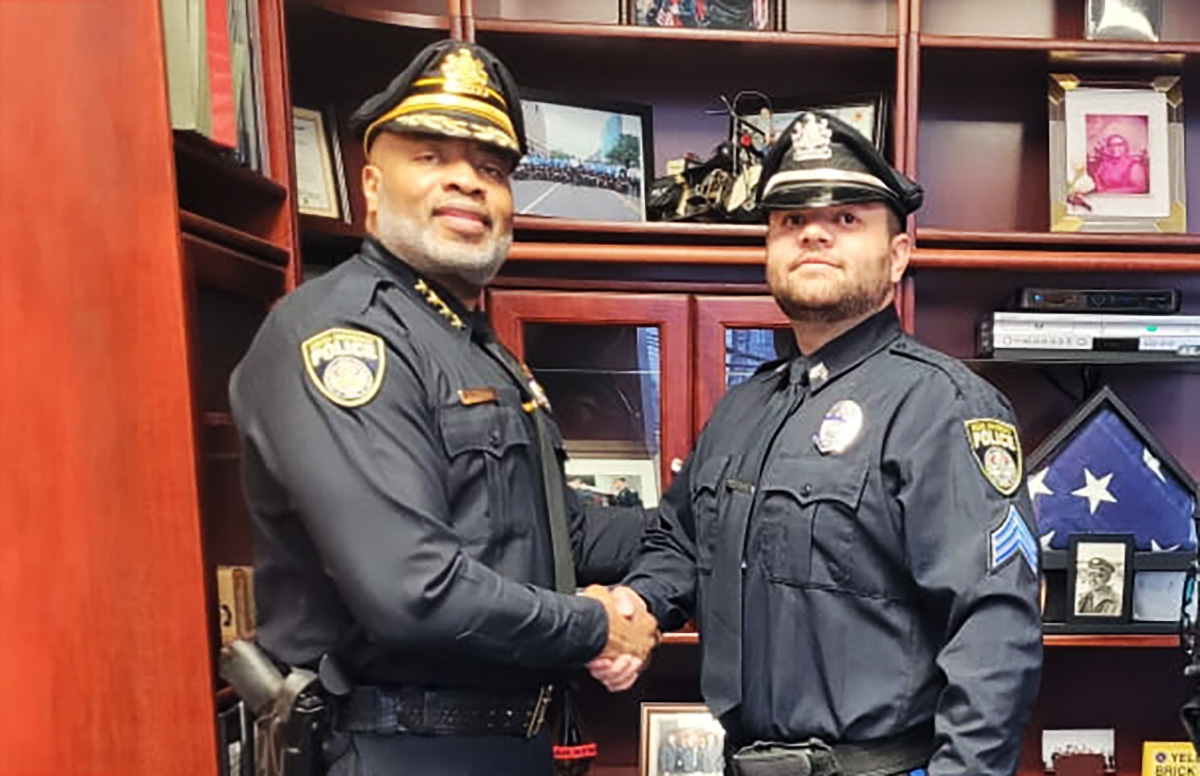 Adkins (right) shakes hands with hands with Vice President of Public Safety Mel Singleton Jr.
Adkins (right) shakes hands with hands with Vice President of Public Safety Mel Singleton Jr.
Timothy Adkins’ path to receiving his master’s degree has been anything but
linear. From his time as a police sergeant to probing encrypted networks as
a cybersecurity student, Adkins has spent the past few years navigating two
worlds: one supervising a squad, the other practicing digital forensics.
Adkins began his secondary education with an associate’s degree in liberal
arts at
Montgomery County Community College
. He then got his bachelor's degree in liberal arts with a focus on criminal
justice at Temple and went on to the Lackawanna College Police Academy to
launch a career in law enforcement.
Looking back, he says, “my studies have always centered around understanding
justice, ethics, and public service, [which] evolved into a current interest
in cybersecurity and digital forensics.”
Throughout five years as a police officer, Adkins saw how issues with
cybersecurity impacted both individuals and institutions. That sparked a new
goal: to combine his understanding of public safety with
the technical skills to help prevent digital
crime.
When researching graduate programs, Adkins was drawn to
Drexel’s Master of Science in Cybersecurity for its strong reputation in applied, hands-on learning. The program’s
flexible online and hybrid format also made it possible for him to continue
serving as a police sergeant and stay present as a father.
“Drexel’s Cybersecurity program stood out because of its strong reputation
for practical, hands-on learning and its emphasis on real-world
application,” Adkins said. “The flexibility of Drexel’s online and hybrid
courses also allowed me to balance graduate studies with my responsibilities
as a police sergeant and father.”
Adkins actively pursued hands-on learning beyond the classroom through
independent research. He built a cybersecurity lab at home to simulate
network attacks and defense scenarios, and conducted in-depth cryptography
labs to study encryption and probabilistic primality testing. In simpler
terms, Adkins stretched his digital forensics muscles by posing as both a
hacker and a defender, learning both how breaches occur and how to fight
back.
“Drexel has added a new dimension: the ability to think in code, analyze
systems, and approach problems methodically. It’s shown me how structured
learning can complement real-world experience and open doors to entirely new
career paths.”
Adkins is scheduled to graduate in March 2026. After earning his master’s,
he’s marrying his experience in law enforcement with cybersecurity to work
in areas like digital forensics, network defense, or threat analysis.
“I see this degree as the bridge between two worlds, public safety and
cybersecurity, and I plan to use what I’ve learned to help protect
organizations and individuals from emerging digital threats.”